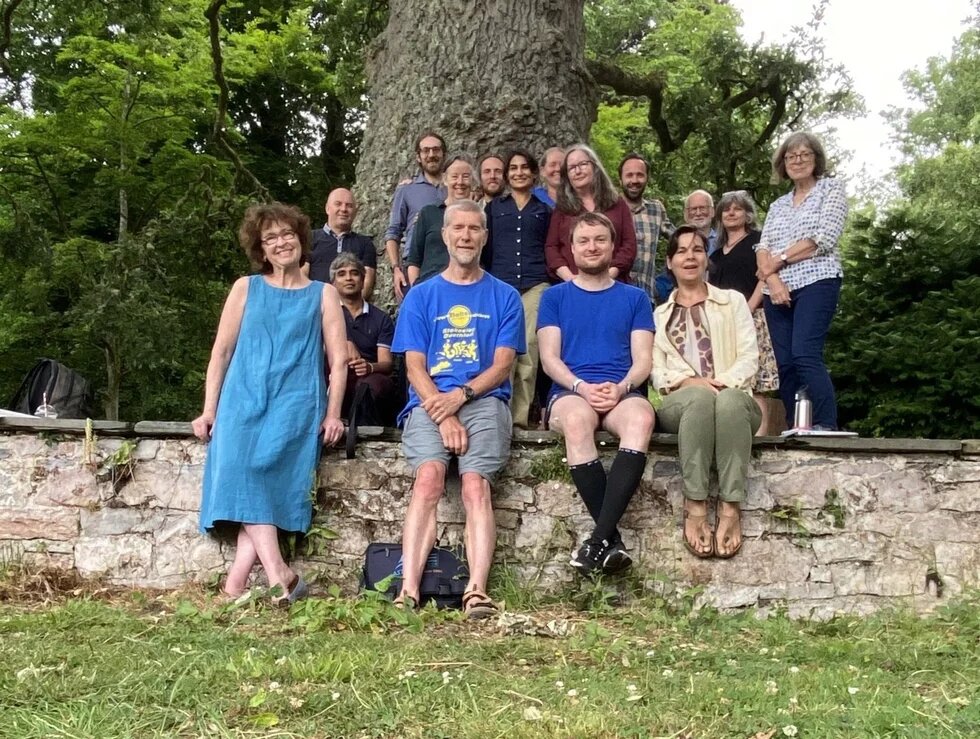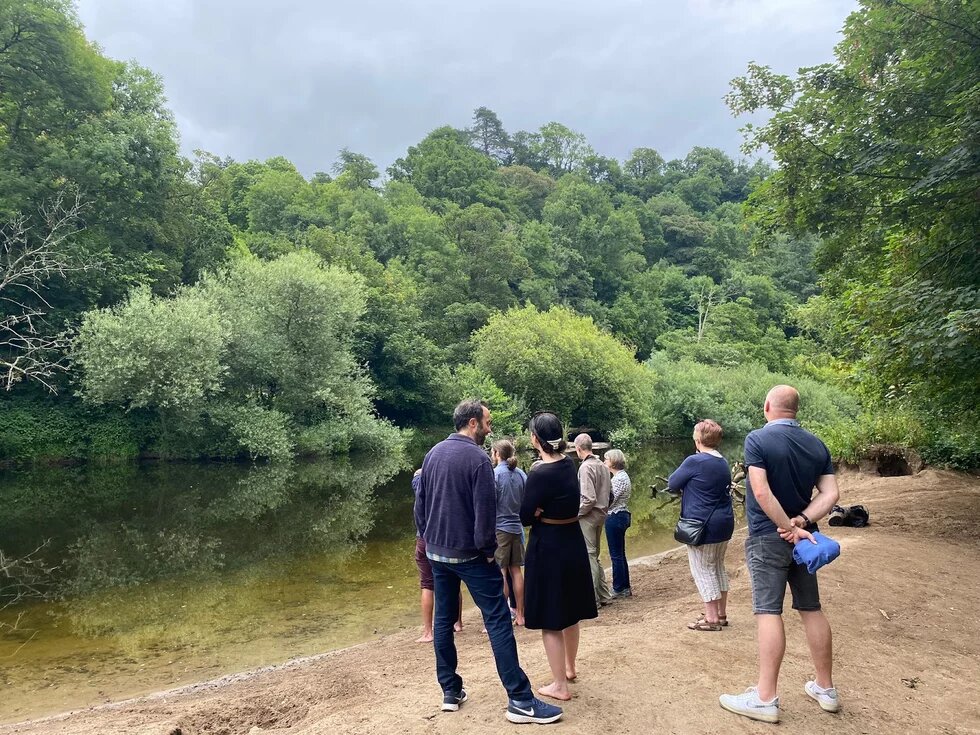
The Rights of Nature (RoN) movement in the UK has been revitalised over recent years, with much of activists’ work focusing on local initiatives for river rights, networking projects as well as alternative, direct approaches.

There was an early flurry of activity around 2005-2010, clustered around the UK Environmental Law Association (UKELA), with some conferences, an excellent research report analysing the extent to which Wild Law already existed around the world was published, and annual Wild Law weekends (which continue!). Then around 2018, there was another burst, with a few research conferences and the first local initiative around the Frome River (more below).
Hopefully this third revitalisation will be the strongest, and indications so far are positive. The number of people working on RoN has grown and more connections have been established. June 2023 saw the first meeting of grassroots groups using the principles and practises of RoN in the UK. This event was held in Dartington and brought together representatives of the Rivers Dart, Avon, Ouse, Cam, Rydale, and Roding, amongst others. A workshop in February 2023 brought individuals of various disciplines together – though only those already known to organisers – and a UK Rights of Nature Network was subsequently formed.
The Network started life as a Whatsapp Group, with members meeting for regular online meetings. In 2024, plans were made for the first in-person gathering of the Network. Following a successful funding bid, members of the group convened in Hazel Hill Woods for 3 days of facilitated strategic work and connection building. In early 2025, the group was formed of 40 individuals from a range of disciplinary backgrounds and current ways of working. Since the Network’s formation, various events have been organised which bring together members of the group for exploratory conversations and presentations.
As well as unaffiliated individuals, and a range of universities, some of the main organisations working on RoN in relation to the UK are the Anima Mundi Law Initiative, Earth Law Foundation, Ecoforensic, Environmental Law Foundation, Gaia Foundation, Lawyers for Nature, Moral Imaginations, Nature’s Rights, and Opus.
The evolving UK Rights of Nature Network is also shaped by place-based projects and grassroots groups including (not limited to) Friends of the River Dart, Friends of the River Cam, Love Our Ouse, the River Roding Trust, and the River Dôn Project. These groups, institutions, organisations, and unaffiliated individuals feed into various societies and networks such as the INSRoN, River Rights Network (more details below), and the SOAS Harmony with Nature Society. All lists are non-exhaustive.
Another important development in the UK RoN landscape is the “A Meeting of Rivers” project. The purpose of the project is exploration of the growing “rights of rivers” movement in the UK, and convening different river groups to support communication and potential collaboration. The project involves four events, each hosted by a different group and addressing a distinct theme related to river rights – “rights”, “representation”, “legal action”, and “ecological health”. Following the first meeting, hosted by the Friends of the River Cam, in September 2024, a River Rights Network was formed, creating a strong basis to grow beyond the membership of 10-15 independent grassroots groups dedicated to local water bodies. The second meeting is due to be held in Sheffield, in the spring of 2025, and will be hosted by the River Dôn Project.
Political Context
The political context is almost certainly part of why RoN ideas took some time to flourish in the UK. Environmental issues were relatively absent from mainstream political discourse until around 2017, when campaigning by Extinction Rebellion, Youth Strike [better known internationally as Fridays for Future movement] and a Green New Deal campaign forced these issues into the mainstream. However, this momentum was diverted by the outcome of the 2019 election, which saw a resounding victory for the Conservative party to continue for another five years. This made for a dire political situation for environmental issues in the UK. Aside from the effects of Brexit and the pandemic, public services were cut even further, inflation and the ‘cost of living’ increased significantly, while wages and jobs moved in the other direction.
Ecological concerns remain a significant issue for the public and in local elections, but have featured little in Westminster politics, where campaigners battle to try to prevent backward steps in environmental protection made possible through Brexit. In the 2024 General Election, Keir Starmer’s Labour Party won with a landslide majority. The level of Starmer’s commitment and ambition in relation to tackling ecological crises – let alone taking a visionary approach such as RoN – are uncertain.
On a more hopeful note, the UK Green Party manifesto 2024 contained RoN in the ‘Bringing Nature Back to Life’ section, pledging to “Introduce a new Rights of Nature Act, giving rights to nature itself”. This mention in the manifesto is an achievement representing how RoN are gaining traction in political spaces. Following the Green Party’s manifesto pledge, a drafting team led by Nature’s Rights began to refine the multitude of possibilities into a workable draft. Aside from developing a legislative framework, it may also be the case that one particular ecosystem or body of water decides to embark on a campaign for legislative protection, in the style of the Mar Menor initiative.
To support either approach, a huge public campaign would likely be needed – though RoN is exactly the type of idea that can inspire and mobilise.
There have been missed opportunities that recent protection campaigns have not taken up the idea of RoN. Extinction Rebellion and related groups have not taken up the idea, and nor have campaigns to prevent exploratory shale gas drilling (‘fracking’) or protect ancient woodland from destruction (such as the Stop HS2 campaign).
Rights of Nature Initiatives: the UK and Ireland
Where grassroots initiatives have flourished is in relation to communities wanting to protect their local rivers. In 2021, Derry City and Strabane District Council and Fermanagh and Omagh District Council each passed motions to set out pathways for the councils to explore with civil society and local communities what RoN might mean in practice, and how the concept could be expressed across community and corporate plans, development objectives, and other strategic frameworks. Donegal County Council in the Republic of Ireland have passed a similar motion.
Further, alongside the Joint Committee on Environment and Climate Action, the Irish Citizens’ Assembly on Biodiversity Loss called for a referendum to incorporate the Rights of Nature and the right to a healthy environment into the national constitution, Bunreacht na hÉireann, in April 2023. The Oireachtas Joint Committee on Environment and Climate Action examined these recommendations at length – producing a report highlighting the fragmented approach to existing environmental governance and accepting the recommendations for a referendum on the incorporation of RoN and/or the right to a healthy environment into the constitution. A debate on the matter was held in the Dáil Éireann on the 18th April 2024.
Promising actions have also occurred in England, with the Lewes Council passing a motion which commits to exploring a Rights of Rivers approach and produces a 'Declaration of the Rights of the River Ouse' which the Council might endorse. This signals an intention and a process to undertake, but only after the follow-up work will there be either policy or legal effects.
These local council initiatives follow in the shadow of a failed 2018 initiative, for the Frome river. Councils have limited powers within the national legal structure; while they can make ‘by-laws’ (the term for local laws which are meant to deal with local issues), these are subject to approval by the national government. The Frome by-law was rejected by the national government on the basis that this law duplicated existing environmental protection. While this missed the point that existing protections are inadequate and failing – and have only got worse since – it may be that the by-law was beyond the Town Council’s jurisdiction. These recent initiatives are therefore developing an approach which will be within the Council’s competency, focused on internal plans and declarations. Whether they do include by-laws – or a future government may be amenable to RoN by-laws – remains to be seen.
Many RoN activists have gone for alternative, direct approaches, in light of the legal and political limitations. Some local nature protectors have adopted the concept of guardianship for specific parts of nature such as trees, rivers and woodlands.
This often includes a Declaration of Rights of the River, which have no legal effect but can have powerful political, cultural and spiritual effects. Working within the existing legal and economic framework, what this means in practice varies, but can include direct practical action (such as e.g. monitoring water quality or removing rubbish from a river), legal challenges using existing laws, and activism against individuals or companies that are harming that part of nature. Such ‘Rights of Nature in action’ approaches are beginning to be taken by many ‘Friends of’ groups in the UK, notable examples being on the River Roding, the River Dart (involving Friends of the Dart as well as the Bioregional Learning Centre), the River Don, the River Deben and the River Cam.
Another such approach – Nature-Positive Corporate Governance – has been piloted by Lawyers for Nature. This has worked with purpose-driven companies who, within the UK’s flexible company law, wish to introduce RoN by representation in decision-making. In 2022, in what we believe to be a world first, the cosmetics firm Faith In Nature appointed a Director to represent nature to its Board of Directors. Following in Faith in Nature’s footsteps, interior design company House of Hackney implemented a similar approach. Lawyers For Nature are looking to grow this approach with third sector organisations and public bodies, such as charities, NGOs and public bodies, both in the UK and abroad.
Other interventions into governance include facilitating processes with communities, organisations, and rivers that incorporate representing the more-than-human world in decision-making by Moral Imaginations. Their approach, which builds on the citizens’ assembly model – the Interspecies Council – is increasingly being used by river communities to drive a worldview shift away from anthropocentric decision-making and towards representing multiple species’ interests in a community. They have also helped people envision different ways to integrate nature into decision-making, such as with Camden Council.
Furthermore, as 2025 gets started, many in the movement are eagerly anticipating the publication of a book titled ‘Is A River alive?’ by bestselling nature author Robert MacFarlane.
The UK RoN movement’s growth continued in 2024. Many groups and individuals beyond the networks and organisations named in this article embedded RoN ideas into their efforts. We have seen a flourishing of RoN in university settings, including the SOAS Harmony with Nature Society, Sheffield Hallam, King’s College Legal Clinic, and the University of Sussex. Grassroots groups are building momentum and continue to strengthen the movement with their lived understandings of the pressure being placed on nature and the public's receptivity to RoN concepts.
This text has been updated and amended by Neil Williams (University of Southampton) and Lucy Gavaghan (GARN representative UK) in January 2025.
Links & Literature
- Lawyers for Nature UK
- Universal Declaration for the Rights of Rivers
- Haroon Siddique (2022): "Give legal rights to animals, trees and rivers, say experts" Guardian.
- Robert MacFarlane (2019): "Should this tree have the same rights as you?" Guardian.




